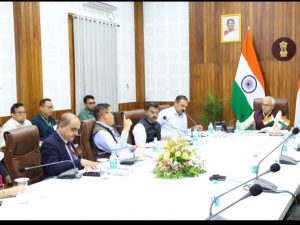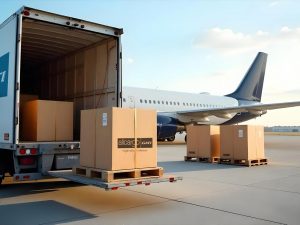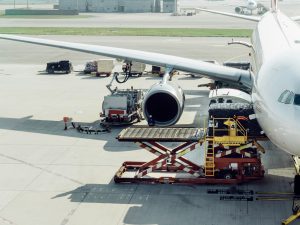The Manipur Government has accorded Industry Status to the Logistics Sector to encourage investments in the logistics sector in the state. According to the state Department of Textiles, Commerce & Industries, the proposal for according industry status to logistics was approved in the meeting of Governor-in-Council held on May 29, 2025. The proposal was taken up in pursuance of the recommendations of the Inter-Ministerial Committee (IMC), Ministry of Development of North Eastern Region, Government of India for integration of Industry 4.0 in manufacturing and strengthening of logistics in the North Eastern Region, it stated.
Read More »Allcargo expands air express service to boost last mile deliveries
Allcargo Gati has announced the expansion of its Air Express service to include direct air deliveries across eight major metro cities: Mumbai, Pune, Kolkata, Delhi, Bengaluru, Chennai, Ahmedabad, and Hyderabad. This strategic move enables our customers to benefit from within-24-hour deliveries, catering to the rising demand for time-critical shipments and seamless logistics across India’s economic hubs. Earlier this year, Allcargo Gati launched direct Air Express services to Varanasi and Imphal, marking a key milestone in connecting Tier 2 cities to the national supply chain grid. With the inclusion of these eight new metro routes, the company is further strengthening its network, making it more robust, reliable, and customer-centric than ever before. Backed by connectivity to 34 commercial airports nationwide, Allcargo Gati’s Air Express service supports high-volume logistics needs across sectors like pharmaceuticals, electronics, garments, automobile and retail, where speed and precision are crucial. The service offers late cut-off times, late pickups and next-day delivery options to ensure unmatched agility and efficiency.
Read More »Air cargo rates remain firm, despite disruptions: TAC Index
Air cargo rates remained firm in May despite trade disruption creating intra-month volatility, according to the latest market report from TAC Index. The overall global Baltic Air Freight Index rose 1.2% compared with April, but remained 5.4% lower than a year ago. “However, an array of countervailing trends led to a lot of intra-month volatility and dispersion in rate patterns on different lanes,” TAC editor Neil Wilson said in his market review. At the start of the month, tariffs implemented by the US on China had been at 145% before a 90-day truce was called and duties settled down to 30%. Tariffs on e-commerce goods have also been lowered to 54% or a flat fee of $100 for postal shipments, or 30% for those using commercial airlines.
Read More »Blue Energy Motors delivers LNG Trucks to boost sustainable ops
Blue Energy Motors has delivered its LNG-powered heavy-duty trucks to Inland World Logistics. The trucks were handed over at a ceremony at the Blue Energy Motors Chakan Plant in Pune. With over 800+ LNG trucks on Indian highways which have surpassed 50 million km, saving 14,000 tonnes of CO2 emissions equivalent to the annual carbon absorption of over 560,000 trees, Blue Energy Motors continues to expand its footprint in alternate fuel heavy-duty trucks. The company strengthens its leadership by delivering clean, efficient LNG trucks, making LNG a practical, accessible solution for diverse transportation customer segments. The trucks offer 30 per cent lower CO₂ emissions and significantly reduced operating costs, making them a game-changer for fleets seeking ESG-aligned efficiency.
Read More »Global air cargo may face uncertainty, decline in volumes: Xeneta
The US administration lowered its additional tariffs on China from 145% to 30%, while China responded by decreasing its tariffs on the US to 10%. This welcome news came too late to reverse a softening in freight rates. The global air cargo spot rate fell -4% year-on-year in May to US$2.44 per kg – the first such decline since April 2024. Xeneta said this could, in part, also be attributed to nearly 20% year-on-year declines in jet fuel costs. According to Xeneta’s Chief Airfreight Officer, Niall van de Wouw, more downward pressure may lie ahead. “Market fundamentals are holding up, but the drop in rates is likely a reflection of declining sentiment and concerns, particularly among airlines, over what will happen once more stability returns to international trade and there is less of a push for the security of airfreight,” he said.
Read More »Kale Logistics Solutions launches Maritime Single Window In Brunei
The Maritime and Port Authority of Brunei Darussalam (MPABD) has announced that its national Maritime Single Window (MSW), designed and implemented by Kale Logistics Solutions (Kale) along with its strategic partner, Primatel Communication Sdn Bhd, has gone live in Brunei Darussalam. The launch was officiated by the Guest of Honour, Yang Berhormat Pengiran Dato Seri Setia Shamhary bin Pengiran Dato Paduka Haji Mustapha, Minister of Transport and Infocommunications and Chairman of MPABD. Yang Mulia Captain (Ret.) Zil Husam bin Haji Abdul Rahman, Chief Executive of MPABD highlighted the launch of the MSW as a milestone in the Sultanate’s continued digital transformation agenda. In his remarks, Yang Mulia Captain (Ret.) Zil Husam stated that “We are taking a major step forward in transforming the way ship clearance processes are conducted in Brunei Darussalam. The implementation of the Maritime Single Window, as mandated by the International Maritime Organization (IMO) under the FAL Convention, allows for the electronic submission, processing, and approval of port clearance information – all through a single online platform.”
Read More »‘Tech-driven, solutions-oriented mindset makes the sector an exciting frontier’
Vaibhav Vohra, Managing Director, Continental Carriers said, “Young entrepreneurs see logistics as a space ripe for transformation. Rather than being deterred by complexity, they’re motivated by the potential to digitize operations, improve efficiency, and create scalable impact. A tech-driven, solutions-oriented mindset makes the sector an exciting frontier. They are integrating automation, EV fleets, smart warehousing, and IoT-based tracking to enhance speed, accuracy, and visibility. Their focus on sustainability and customer-centricity is making logistics more agile and future-ready.
Read More »‘Use innovation to solve inefficiency, modernise processes’
Kunal Maheshwari, Chief Growth Officer, Softlink Global said, “There’s a massive opportunity to transform a traditionally complex, fragmented industry with fresh thinking and technology. Many young entrepreneurs see the opportunity to introduce innovation for solving inefficiencies, modernizing systems, and making a lasting impact in an industry that is widely considered the digital backbone of the global economy. The focus is on adopting a tech-first mindset—using AI, automation, and data analytics to enhance visibility, speed, and cost-efficiency. From hyperlocal delivery models to digitized warehouses and end-to-end tracking platforms, young founders are making logistics smarter, more agile, and customer-focused.”
Read More »Qatar Airways Cargo, Skyways team up to boost digital efficiency
Qatar Airways Cargo has successfully launched host-to-host API integration with Skyways Group, enabling real-time pricing, capacity visibility and instant booking confirmations. “Marking our first customer host-to-host integration in the Indian subcontinent region, this will be rolled out across all our origins where Skyways Group offices are located, bringing seamless e-booking capability to more customers,” said Qatar Airways Cargo in official LinkedIn Post. “With this launch, we are enhancing efficiency, speeding up response times, and making it easier for our partners to do business with us. A big shout out to the amazing teams at Qatar Airways Cargo and Skyways Group for making this happen. It’s always inspiring to see what we can achieve when we work toward a shared vision,” the post added.
Read More »‘Redesigning logistics around speed, sustainability & smart tech’
Chandrima Govil, Director, Activair Airfreight said, “We at Activair & MKF as the 2nd Generation of Freight Forwarders in the family recognise the need to replace outdated processes with agile, tech-driven solutions. The surge in e-commerce, rising customer expectations, and global supply chain disruptions have made logistics a strategic growth area. Activair’s approach reflects this shift—combining years of operational experience with forward-looking innovations in air freight, warehousing, and customs. For this new generation, logistics is not a burden but a platform for meaningful, scalable impact. We are redesigning logistics around speed, sustainability and smart technology. We have adopted, integrated, real-time solutions across the supply chain. In last-mile delivery, we leverage micro-fulfillment and flexible courier networks. Air freight is digitized for faster bookings, transparency, and smarter routing. Warehousing shifts toward decentralized, tech-powered hubs, while IoT-enabled tracking ensures visibility from origin to doorstep. Activair’s evolution reflects this mindset—balancing legacy strengths with digital tools to meet the demands of modern commerce. These innovators view logistics as an interconnected system, driven by data, automation, and customer experience.”
Read More » Cargo Breaking News
Cargo Breaking News








